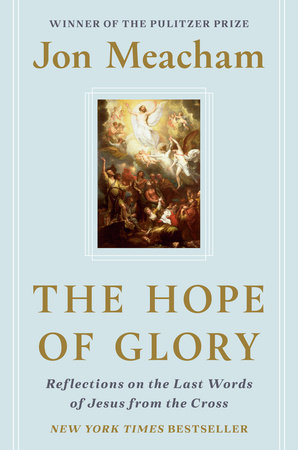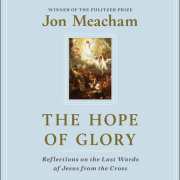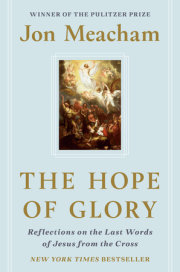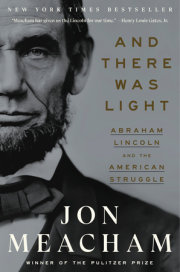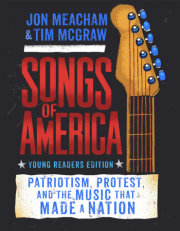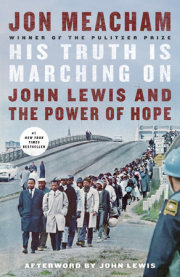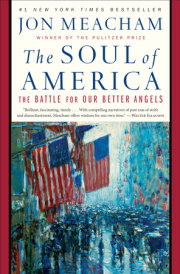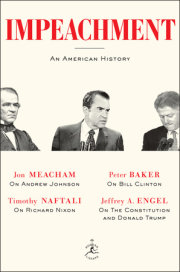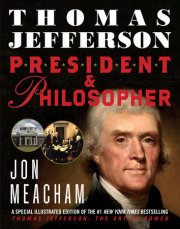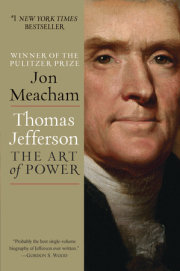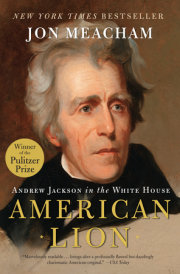Chapter 1
The First Word
There were also two others, criminals, led with Him to be put to death. And when they had come to the place called Calvary, there they crucified Him, and the criminals, one on the right hand and the other on the left. Then Jesus said, “Father, forgive them, for they do not know what they do.”
And they divided His garments and cast lots. And the people stood looking on. But even the rulers with them sneered, saying, “He saved others; let Him save Himself if He is the Christ, the chosen of God.”
The soldiers also mocked Him, coming and offering Him sour wine, and saying, “If You are the King of the Jews, save Yourself.” And an inscription also was written over Him in letters of Greek, Latin, and Hebrew:
THIS IS THE KING OF THE JEWS. —Luke 23:32–38
Jesus’s first remark from the cross is found exclusively in Luke: “Father, forgive them, for they know not what they do.” It’s fitting that the first word should be as problematic as this one is, for the drama of the cross is itself mysterious.
Let us briefly recapitulate what we know about the road to Golgotha. Born to Mary, a young woman, Jesus preached the coming of the Kingdom of God, a kingdom that would unseat the temporal powers of the world and bring about a universal acknowledgment of Israel’s God. “Repent,” he said, “for the kingdom of heaven is at hand.” In Mark, likely the earliest gospel, Jesus was reported to have foretold coming chaos, and then order:
And when ye shall hear of wars and rumors of wars, be ye not troubled: for such things must needs be; but the end shall not be yet.
For nation shall rise against nation, and kingdom against kingdom: and there shall be earthquakes in divers places, and there shall be famines and troubles: these are the beginnings of sorrows. . . .
In those days, after that tribulation, the sun shall be darkened, and the moon shall not give her light,
And the stars of heaven shall fall, and the powers that are in heaven shall be shaken.
And then shall they see the Son of man coming in the clouds. . . .
And then shall he send his angels, and shall gather together his elect from the four winds, from the uttermost part of the earth to the uttermost part of heaven. . . .
Verily I say unto you, that this generation shall not pass, till all these things be done.
In his public ministry, Jesus attracted devout followers. Performing miraculous deeds, he appeared to cure the sick, exorcise demons, and even raise the dead. The reports of his triumphant entry into Jerusalem in the week before his final Passover suggest that he was embraced enthusiastically by Jewish pilgrims to the holy city—and was thus seen as a destabilizing force by Jerusalem’s ruling authorities. (Jesus was executed in the wake of anti-Roman activity bloody enough to have resulted in the conviction of at least three other men, including Barabbas, whom the gospels tell us was being held for execution for his role in that violent episode.) It was, then, a time of tumult and of uncertainty, and, historically speaking, the crucifixion was probably the result of ecstatic crowds looking to Jesus to bring the kingdom to earth right then.
If Jesus had truly been a revolutionary threat in the traditional sense of leading or inspiring an armed uprising, he would most likely not have been the only figure from his circle to die. His followers were left alone in the aftermath of the crucifixion and were free, in the fullness of time, to settle in Jerusalem as they worked out a new understanding of what Jesus’s death on the cross and his empty tomb meant. Complex matters, and big themes—the biggest, really, one can conceive of. And why not? The Christian undertaking, derived from its roots in Judaism, is about a cosmology that attempts to account for the seeming triumphs of evil and asserts the conviction that justice and goodness will prevail. Of course it’s complicated.
The Seven Last Words are collected from the different gospel accounts as a devotional exercise, and the church has long chosen to begin its Good Friday services with Jesus’s words of absolution. Yet my sense is that we take the wrong lesson from Jesus’s declaration of forgiveness if we read it—as many preachers do—as an affirmation of the wideness of God’s mercy. Look, sermon after sermon has asserted, look at the amazing grace of Jesus; even in the starkest of pain and in the most exquisite of agonies, the Son of man embraces all sinners, extending salvation to the torturers who are in the midst of murdering him.
True, the theme of forgiveness is a strong element in Luke’s Gospel and beyond. (Dante would refer to Luke as “the scribe of the gentleness of Christ.”) Earlier it is Luke who recounts Jesus’s teaching to “Love your enemies, do good to those who hate you, bless those who curse you, pray for those who mistreat you.” Later, in Acts, Luke writes of Saint Stephen’s similar prayer that the Lord forgive those who persecute him. Another ancient source claims that in the early sixties, James, the brother of the Lord, prayed, “Lord, God, Father, forgive them, for they do not know what they are doing” as those in a rival party stoned him.
It’s tempting, then, to interpret Jesus’s own words of forgiveness from the cross as an embodiment of his mission of mercy to the world. Here, though, is the problem as I see it: If God’s plan required his Son’s death and resurrection, then why would the agents of that plan require absolution? We are taught that Jesus had to die as a ransom for many. Without his suffering, death, and resurrection, then there would be no salvation, no new heaven and new earth. Nowhere in the New Testament does anyone argue that Jesus could accomplish the work of redemption by living out a natural life and dying gently in his sleep deeper into the first century. No, the story is the opposite: Jesus was to submit obediently to the will of the Father, who had decreed that his Son would die a violent death so that all might one day be forgiven their sins and granted eternal life.
Standing as we do so many centuries removed from the events we commemorate in Holy Week, let us be clear: Jesus’s death was essential to Christian hope. So why does Luke have Jesus seem to be forgiving his tormentors for playing the critical and necessary role in bringing about the salvation of the world and the coming of a kingdom of justice?
The answer may lie in the cares and concerns of the gospel writer himself. We should put ourselves as far back as we can into the decades following Jesus’s Passion. Our gospels were composed forty to seventy years after Jesus’s death. Each was written with certain audiences and particular communities in mind. Some themes are underscored, some downplayed, depending on those whom the evangelist is trying to reach and to convince. Seen in this light, Luke’s inclusion of the “Father, forgive them, for they know not what they do” line is a mark of rhetorical genius. Any Gentile hearing the story in that Roman-dominated world could feel exculpated, for the imperial authorities were being exculpated, enabling the Gentile audience to put away its anxieties about its complicity in the murder. Any Jew hearing the story could also feel exculpated; the Temple establishment had done what it had done, but here was Jesus himself, in Luke’s rendering, forgiving the sin.
It is illogical to hold either the Romans or the Temple establishment as in any sense “guilty” for the death of a Savior whose suffering was foreordained and whose mission inaugurated a salvation history that shall wipe away every human tear. We, however, are coming to the story—and to the cross—with the benefit of centuries of theological reflection. For those first generations of Jesus’s followers, the saga of the Lord’s ministry and Passion was paradoxical and confusing. It can be even yet, for the work of the cross marks a radical departure from ordinary human experience.
The task of the evangelists—the task of Luke—was to bring as many souls into the fold as possible at a time when the Christian movements were tenuous and fragile. By reporting that Jesus himself had forgiven all those who might be blamed for his brutal death, Luke was making the faith more accessible and appealing than it might have otherwise been. There was world enough and time for talk of nuances like the ones we are discussing now. In the rough-and-tumble of the first century or two, a time of political strife and social upheaval, best to cast the widest net possible.
Luke was particularly skilled at this complicated task: His gospel, as well as his volume the Acts of the Apostles, is a literary epic. It was Luke who gives us, for example, the Magnificat (“My soul doth magnify the Lord, And my spirit hath rejoiced in God my Saviour”) and the Benedictus (“Blessed be the Lord God of Israel, for he hath visited and redeemed his people; And hath raised up a horn of salvation for us in the house of his servant David; As he spake by the mouth of his holy prophets, which have been since the world began: That we should be saved from our enemies, and from the hand of all that hate us”). He writes of epiphanies, of the revelation of Jesus to the greater world.
Copyright © 2020 by Jon Meacham. All rights reserved. No part of this excerpt may be reproduced or reprinted without permission in writing from the publisher.

